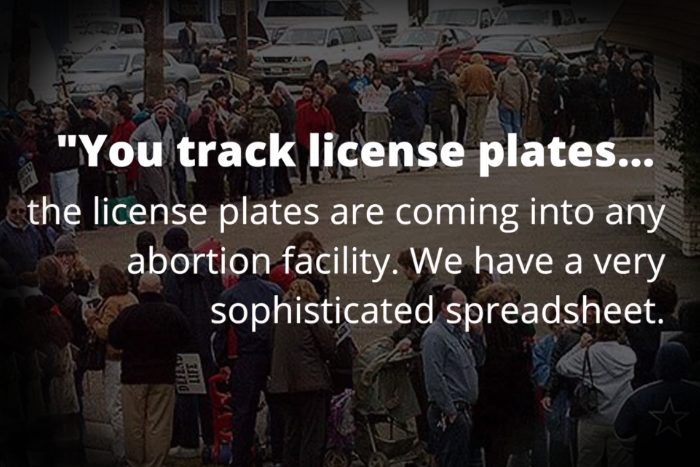Texas Abortion Clinic Protesters Told to ‘Track License Plates’
Anti-choice groups trained future clinic protesters as a federal court heard arguments in a new lawsuit challenging Texas' omnibus anti-abortion law.

At an abortion clinic protester training at the Texas state capitol last week, anti-choice leaders told their trainees to write down the license plate numbers of abortion-providing doctors and abortion-seeking patients, so that they could track which doctors have admitting privileges at local hospitals and which patients did or did not ultimately choose abortion.
“This way, you can track whether or not a client comes back,” said Karen Garnett, the director of an anti-choice Catholic group in North Texas, in an audio recording made by NARAL Pro-Choice Texas, members of which attended a “Keeping Abortion Facilities Closed” training event held last week.
The training was held on the first day of the Whole Woman’s Health v. Lakey trial, the latest federal challenge to Texas’ omnibus anti-abortion law, HB 2, which bans abortion after 20 weeks, restricts the prescription of medication abortions, requires abortion clinics to operate as hospital-like ambulatory surgical centers, and mandates that abortion-providing doctors have hospital admitting privileges.
Karen Garnett can be heard on the recording telling her trainees that her group has a “very, kind of, sophisticated little spreadsheet” they used to track the identities of abortion-providing doctors.
Heather Busby, the executive director of NARAL Pro-Choice Texas, called these protest tactics “stalking” in a press release that accompanied the recordings.
“Texas women are now not only forced to travel hundreds of miles to even access a safe and legal Texas clinic, but once they reach a clinic they must also confront the very real threat posed by these anti-abortion activists,” said Busby. “The anti-abortion harassment tactics outlined in this disturbing training lead women to seek dangerous alternatives.”
Having the sidewalk “lined with protestors,” said Garnett in the audio recording, turns potential clients away from abortion clinics: “they don’t want to drive in because they see our presence there.”
When anti-choice Texas lawmakers passed HB 2 last summer—despite a 13-hour filibuster from state Sen. Wendy Davis and the presence of thousands of reproductive rights supporters who descended on the capitol—legislators said that the law was meant only to increase the health and safety of abortion-seeking Texans, though Texas’ lieutenant governor, David Dewhurst, tweeted at the time that closing clinics was indeed the intent of the law.
And at the clinic protester training last week, a 40 Days For Life organizer named Eileen Romano said that the “poorer ones”—low-income Texans seeking abortion care—began going to the local Beaumont, Texas, crisis pregnancy center after the passage of HB 2, because they “didn’t have transportation” to access a legal abortion facility.
“God is good,” said Romano.
Four abortion-providing doctors have been killed, along with four more abortion clinic staffers, in anti-abortion clinic violence since 1993, according to the National Abortion Federation.
The Catholic Diocese of Fort Worth’s Michael Demma told trainees that his group, Respect Life, is “searching” for one of two abortion-providing OB-GYNs at the Whole Woman’s Health facility in Fort Worth.
“We have been able to identify one in there and we’re still searching for the other,” he said in the recording.
Professional anti-choice activist Abby Johnson, who famously left her job at a southeast Texas Planned Parenthood facility in 2009, told the trainees that “abortionists are feeling the pressure” from anti-choice groups, and that she had identified the potential new location of an abortion-providing ambulatory surgical center in Austin.
“I think they feel like they’re on the run,” Johnson told the trainees, “and that’s how we want to keep it.”
Closing arguments in Whole Woman’s Health v. Lakey will begin in Austin on Wednesday morning. The plaintiffs, a group of independent Texas abortion providers practicing across the state, say that the law imposes an undue burden on providers and patients, forcing them to drive hundreds of miles for legal abortion care. The State of Texas has argued that long-distance travel does not constitute an undue burden, and that it need only show that lawmakers had a “rational basis” for passing the law.

